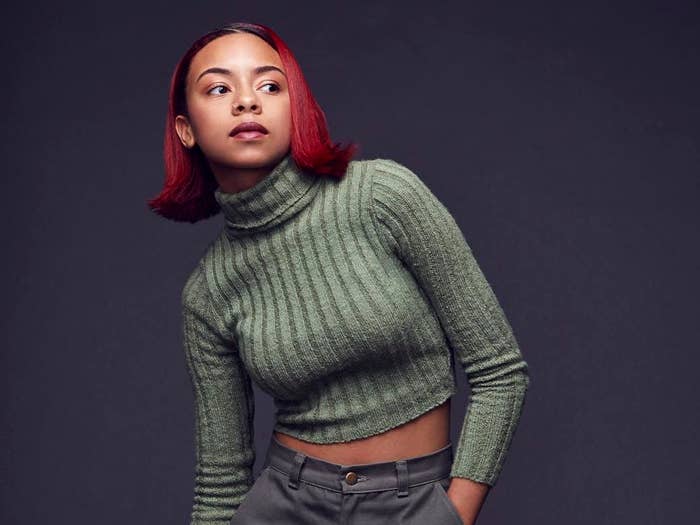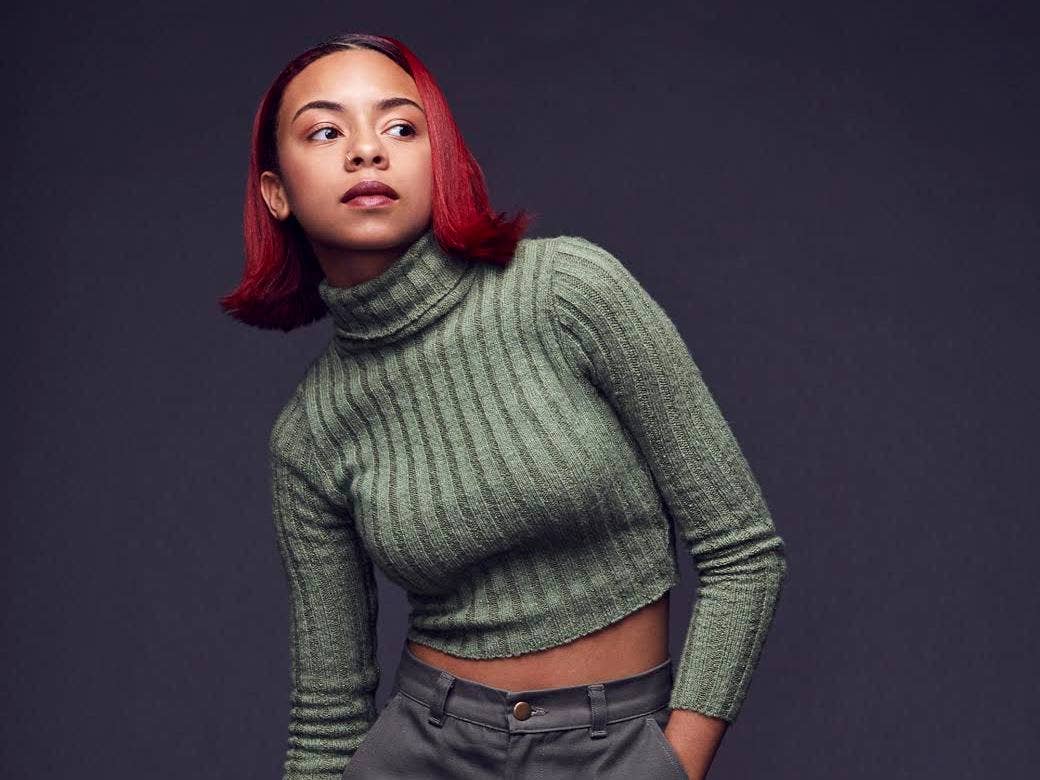
Ravyn Lenae is prepping for bed when our cross-country call connects. Counting down the days until backstage greenrooms take over from high school hallways, the Chicago wunderkind sets a 4 a.m. alarm to catch the bus. To put this in perspective, imagine senioritis, then apply that to a girl who’s generated millions of streams and collaborated with emerging hometown heroes.
Lenae is ready to bid farewell to lectures.
A disciple of Erykah Badu and OutKast, Ravyn stitches together everyday observations, internal ponderings, and mercurial puzzles that she herself doesn’t solve until months later. Her characters run point; she lets them lead the way, lifting a page from the notebooks of authorial greats.
The stage offers a chance to share these voices with fans new and old. Last month, she stole the show at our No Ceilings concert in New York, and a nationwide tour with Nonamecontinues in the coming weeks. If you get a chance to see Lenae, take it—you will find yourself instantly enchanted, and the poise and confidence this young artist brings to the stage suggests she has a long and fruitful career ahead of her.
Read on to learn more about Ravyn’s stunning Moon Shoes EP, her experience working on Noname's Telefone, and the creative process that enables it all. Stay tuned for more news of her forthcoming project, currently in the works for a spring release.
You’ve done a lot of great work in and outside of Chicago, especially with Monte Booker, but many fans were first introduced to you through Noname this past summer on “Forever.”
It’s really weird, because around the time when I started getting into music, these were the people who were already on, people I looked up to. It’s really refreshing to be on a song with the people I looked up to. I’d been around Noname a few times before making that song, and there’s a mutual respect that artists have for each other in Chicago. A lot of it is unsaid or unspoken, but it’s a vibe everyone gives off—like a musical family. So when I was asked to be on her project, I felt very honored, to be honest, because, like, lil ol me? She reached out to me personally and it all happened pretty quickly. I wrote the verse the day before the session.
Even though the current crop of Chicago’s top artists are so young, you still feel like the city’s future in a sense. What’s a valuable piece of advice you’ve received?
I was talking to Monte Booker. We’d get together at least once a week. He’d drive me home, and on the way home we’d have a whole conversation while listening to music. I remember he told me that no matter where music takes you, make sure you’re doing it for the love of the music and nothing else. I think that has driven me because it removes distractions. I make music for me. It’s therapeutic and helps me release my emotions. I also like to explore how other people feel, too, so that the music aligns.
It’s not easy to do in music, but it really is so important.
I remember [Monte Booker] told me that no matter where music takes you, make sure you’re doing it for the love of the music and nothing else.
It really is. And I think the fact that I have these people around me keeps me in that place. I have humble, amazing artists around me all the time. It keeps me leveled.
Some of your idols—Erykah Badu, OutKast, Pharrell—seem to carry that music-first focus. In what way did your influences impact you most? You’re clearly a great songwriter.
Songwriting is definitely a big one. And even beyond that, personality in music. A lot of music lacks that nowadays. Not a lot of people paint pictures anymore with words. I look to artists like OutKast and Erykah Badu because they executed there. I feel like a lot of key aspects of music are being lost, and they need to be replenished by up-and-coming artists.
I’ve always been into writing, so it came naturally for me. A lot of people ask me if I was into poetry first, and I don’t consider myself a poet, which is really weird because of a lot of the things I say. But I just can’t say a lot of the things I say without music involved. Poets rely solely on the cadence of their own voice, and I don’t see how they do that. I have to have music to relay my message in a clear way, otherwise it’d be garbage. [Laughs]
What sounds tend to click with you, guide you in a way?
I like to—I don’t want to sound crazy but when working with producers or just write in general, I like to create characters. None of my songs are actually me, they’re characters I’ve created. So everyone has yet to hear Ravyn Lenae’s story. They all occupy this other world in my head. I can’t tell a story without creating characters and a plot, and the producers I work with help me create that whole scenery—the fairytale, I guess. So a lot of my songs have this sense of delicacy, imagery, sometimes elegance…I like to play with different themes. I’ve never articulated this before. I’ve just gone through a lot of different people inside of me and they come out whenever they feel compelled to, or a beat inspires them to come out. Now, I’m in a whole different realm writing-wise and beat-wise than I was for the last project. I know it sounds a little weird.
None of my songs are actually me, they’re characters I’ve created. So everyone has yet to hear Ravyn Lenae’s story.
I think that’s powerful. Even if the listener doesn’t know your process, that focus will still be palpable. Which song, which character, off of Moon Shoes do you feel most connected to?
Hmm. I really connect with the character I wrote for “Sleep Talking.” Just because—I’ve never talked about this before. Just because I feel like I’ve been in the shoes of that character and I know what the character’s experiencing. It’s weird because I write the songs, then I come back two months later or three months later and say, “Oh, that’s what I was talking about!” It can take me awhile to figure out what the character’s trying to say, if that makes sense. Sometimes they’re pulling from my experiences, and I have to figure out what that point in my life was. I get to look through a memoir of my experiences in that way. I have trouble communicating my feelings sometimes. I keep things bottled up. Or I’ll put subliminal messages in my songs because I’m private about things. But it’s fun to search for meaning, or look for the themes and hidden messages.
A lot of authors say that they know they did a good job when the characters make their own decisions. Has high school helped you in any way or are you counting down the days?
I hate school! There’s no way around it. I think it’s just the overwhelming feeling of needing to be done with something, needing to move on. I don’t like when things feel past due or they’re overflowing into another part where they’re not supposed to be. It’s time for a new chapter. I like being spontaneous, not knowing what I’m going to do tomorrow. I like to search for meaning instead of it being presented to me and taught. A lot of things you can’t learn in school. You can’t be at a desk. On the flipside, I go to Chicago High School for the Arts, and I’m very grateful to be classically trained and apply that to my own career. That’s really helpful. I don’t want to trash the school. It’s just me as a person. It’s in my blood to break free.
I know you’ve heard this a million times already, but try to enjoy it.
[Laughs] Why does everyone always say that!
How do you view yourself in today’s music climate?
This is what I compare it to. You know how everyone has a house smell? When you walk into the house, everyone can smell it except the person who lives there. It’s really hard to smell that just because I’m the person doing it, if that makes sense. I love when people compliment my writing rather than my voice, though. Anyone can sing a note. I like words. You can use three words and it means so much. I like to study the way other artists arrange them to mean something. I’d hope that people appreciate my writing style, the way I convey messages—that means much more to me than someone tweeting at me, “I love your voice.” If they tweet about the writing, then I really connect with them. It’s beyond the melodies, they’re finding depth and meaning.
Have you ever considered stopping music, or has that never been an option for you?
It hasn’t been an option for me yet, but I think every artist is forced to that point. Everyone hits rock bottom but I haven’t yet. I will say I’ve been discouraged. You have people who have their opinions, and an artist needs to develop tough skin. Everyone’s not going to like your music, everyone’s not going to like you. It’s the way it is. I have the choice to take it however I want to, and I try to take it in the most constructive way possible. It’s tough when you consider music your baby, though, and you see people poking at it, calling it names. It’s a vulnerable job.
It’s tough when you consider music your baby, though, and you see people poking at it, calling it names. It’s a vulnerable job.
When did you start working on Moon Shoes?
You know, the project was actually super unorganized. I didn’t know I was making a project, actually, I was just making songs, and then it happened to become Moon Shoes. It was just me releasing these characters, not knowing it would become a body of work. It just so happens to be a little cohesive. Making music is a super intimate thing. Luckily, with Monte, we were friends, and we established that connection before we started working together. It grew as we worked together. Just the sense of him knowing me, and knowing what I like and vice versa—I love being with a producer when they build something from scratch. Me and Monte will just sit in the studio all day. I think that’s the best way for me to get a sense of what the proper direction is. It’s more organic that way. I don’t really like when people send me beats—unless it’s super raw.

